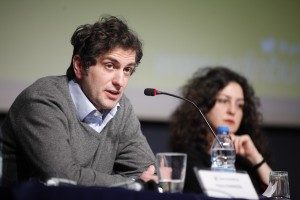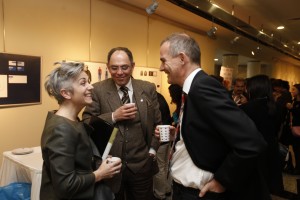Writers Opened up New Windows in İzmir
The İzmir leg of Edinburgh World Writers’ Conference held at Yaşar University was quite an inspirational event for the participants: writers from UK, İstanbul and İzmir, academicians, translators, students, professional readers ( as one member of the audience named herself), international guests. And of course literature was in the spotlight for two days as introduced by the Acting Chair and academician Trevor Hope, during his opening speech. We as the audience were lucky enough to hear a number of diverse voices coming through the open windows – some which we recently discovered and some we did not even existed beforehand.
Literature in Translation, chaired by academician Jeffrey Hibbert, warmed up the stage for upcoming discussions.
Writer and translator Murat Uyurkulak mentioned the indifference of the “West” for the “East” comparing the the current level of 3 % translated books with the previous 20 % in the 1950′s. Translation helps to cross over the boundaries created by nationalism and history, and the translator brings people closer to each other, he added.
Writer Denise Mina made some bold remarks saying, ‘All writers steal from each other. We are thieves . Therefore we need to support each other as a community of writers. This is especially important for the writers of three dominant languages – Spanish, Chinese and English – to avoid dominating the world and freezing out minority language writers.’
A National Literature? the question was addressed by two keynote speakers: writers Sema Kaygusuz from Turkey and Panos Karnezis from Cyprus / UK in the afternoon session.
First Sema Kaygusuz introduced her viewpoint with a strong tone of criticism on the ideological oppression some states exercise through citizenship in the modern era. She explained why and how all writers are in fact homeless nomads not confined to a single land. Therefore, literature does not stop at national borders; she is against the social engineering of designing a nation with literature as a vehicle. She ended up with the warning that hidden domestication is the real threat of our times! And as a solution, she proposed that the dignity of the creators of art should be the first priority, then the art itself…
Panos Karnezis set out to discover the common elements of a national literature like homeland, local setting, language, race and literary tradition – each time ending up with more questions then before. How can we define the “nationality” of Kundera, Kafka, Nabokov, Conrad? He ended up with the tale of the Tower of Babel placing translation in a key role: ‘As writers and readers, writing and reading in a multiplicity of languages but being able to understand each other through translations, we are the children of the builders of Babel who want to return home and build the tower that would unite us again. But this time it will not be made out of bricks but something indestructible: words.’
When asked about their interaction with social media; Denise Mina said: ‘Arguments are reduced to adversarial binary discussions on Twitter: a simple Yes or No. Therefore I avoid it’
Şebnem İşigüzel described using Twitter as ‘like opening a window and letting go with a loud scream or a strong wind.’ Inci Aral remarked that too much social sharing affects her literary production negatively. Murat Uyurkulak used to resist Twitter but now embraces it as a source of timely and uncensored news. Sema Kaygusuz said that social media will be a powerful platform for sharing once we learn how to use it effectively.
After keynote speeches followed by two panels discussions, the attentive audience was full of further questions, some of them still lingering in my memory :
-The rise of the novel supported the creation of national communities in history. Is the same thing happening now with globalization or other media (ie movies) taking over this ideological role?
-Are there specific literary forms from your cultural roots or literary tradition affecting your writing?
-The reader is the recreator of art; does that in any sense inhibit what you put on paper?
-Do nations also need narratives to help heal their traumas?
The day ended with a reception just in time to allow for short chats with the writers and for turning over the ideas and images of the day in our minds.
The next day started with a Session for Aspiring Writers, chaired by writer and translator Kerem Işık.
He talked about his own metaphor of writing as gardening, scratching about for something. Writer Şebnem İşigüzel explained her own metaphor of opening up windows in a wall, being able to see through the blindfold. İnci Aral explained her own experience as a construction, first piling up then building. Denise Mina used the metaphor of archeology. Panos Karnezis described writing as more of a technical process and advised novice writers to imitate their favorite writers in the beginning observing “what?”, “how?” After some time you learn to create your own voice’, he said, with a quote from Picasso ‘Bad artists copy, good artists steal.’
In the afternoon session, writer İnci Aral from Turkey and writer Denise Mina, from Scotland discussed The Future of the Novel.
İnci Aral spoke first, reminding us that the death of the novel has been proclaimed with alarming regularity over the years as the genre moved away from the more traditional novel. However, the novel captures human experience so neatly and brings meaning to its existence, that it can even create a common human memory by expanding individual stories. She spoke about the threat posed to the novel by the market conditions that encourage uniformity, shallowness and visual culture. She concluded with saying, ‘In order to protect its spirit and to win back its lost nobility the novel today must grasp life in all its aspects, foresee all the signs and feel the pain of the times.’
Denise Mina mentioned that the future of novel could be a totally different thing : we even may not call it novel, crime fiction could become cowboy fiction or no artefact like a book may exist anymore. There are a few reasons for this: digital copyrights allowing anybody to change anything you’ve written. She hates this because it disturbs the integrity of the work, even its politics. Therefore, writers need to find other means of owning intellectual property and further discuss the notion of authorship. If these developments go unchecked, working class people will not be able to publish because they won’t be able to make any money. The impression I got from her words is the “Death of the Writer” as opposed to Death of the Novel. As a funny example of copyright issues, she mentioned what happened to her friend: a book purchased on a Kindle disappeared one day due to copyright problems. She also warned that power is being concentrated in the hands of fewer and fewer people. Because a few giant bestselling books sell a lot but experimental novels sell less; therefore the gulf between these two groups is getting wider and wider. She made a call to writers: ‘We are not individual voices in a void but a chorus , so as a community of writers we have to protect the people coming after us.’
Following a discussion on questions of self and state silencing, activism, the self- consciousness of writer, sources of inspiration, changing stylistic approaches and the impact of visual culture, the day came to an end.
It was again Trevor Hope’s turn to close the conference, saying: “We want to thank you all for sharing with us more of your stories, opening windows in walls we didn’t even realize were standing before us, creating a narrative appetite and feeding our hunger for stories.”
So ended the frenetic pace of these two days full of mind-expanding discussions and inspiring conversations on literature.


